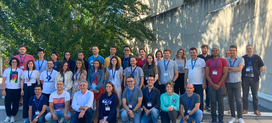RS-Lab members winners of AGORA Aerosol Training Course competition
On June 5-23, 2023, Afwan Hafiz, our PhD student, and Zuzanna Rykowska, a masters student, both carrying out work under the supervision of Professor Iwona Stachlewska at the Remote-Sensing Laboratory of the Institute of Geophysics, Faculty of Physics, University of Warsaw, took part in the AGORA Aerosol Training Course as part of the Trans-National Access project of the European Commission ATMO-ACCESS Sustainable Access to Atmospheric Research Facilities.
Qualification took place through an open competition in which more than 100 candidates from all over the world participated. Ultimately, only 20 successful candidates qualified. The aim of the course was to characterize atmospheric aerosols using in-situ and remote techniques, in hybrid training. The training took place in a classroom format at the Andalusian Global Atmospheric Observatory AGORA of the University of Granada in Spain, which included a visit to the Sierra Nevada station located in the mountains and hands-on learning on novel aerosol instruments. The training was combined with remote classes one week before (2 days) and one week after the course (5 days). Interactive classroom lectures (5 days) additionally provided a basic knowledge of advanced techniques for measuring aerosol properties, including in situ instruments, remote sensing, and laboratory instruments. During the hands-on class, participants learned about the operation of several types of nephelometers, including the CRDS (Cavity Ring-Down Spectrometry) method. There was also a demonstration of lidars and a solar photometer, along with other instruments on the observation platform, located on the roof of the Instituto Interuniversitario De Investigación Del Sistema Tierra En Andalucía (IISTA).
The training ended up with group project presentations. The "Lambda Team" group, of which Afwan Hafiz was a member, focused on the comprehensive 4D characterization of atmospheric aerosol particles, during an episode of Saharan dust incidence, using a synergy of EARLINET Raman lidar and AERONET solar photometer measurements at the Granada station, synoptic analyses and back trajectory calculations with the HYSPLIT model. The "Lambda Team" was led by Juan Antonio Bravo-Aranda and Sol Fernández-Carvelo. Zuzanna Rykowska, along with other members of the "Gamma Team," led by Francisco Navas-Guzmán and Jesús Abril-Gago, worked on methodologies for using ground-based passive (photometers) and active (ceilometers) remote sensing, as information for the inversion model using the GRASP algorithm at measurement stations in a dozen locations, and the BSC Dust Forecast model (Barcelone Supercomputing Center) and the NAAPS model (NRL/Monterey), as well as the EOSDIS World-View satellite data visualization tool (NASA) for continental-scale monitoring of Saharan dust intrusion over Europe.
After the projects were approved, participants received certificates of completion of the training.
Originally published on - July 12, 2023, noon
Last update on - July 17, 2023, 1:18 p.m.
Publisher - Sekretariat IGF
PHOTO GALLERY

